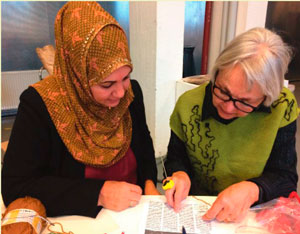Social networks as a driver of integration
 In this lecture we will present our research on ’Integration with, not integration of: the potential for social networks in refugee integration’.
In this lecture we will present our research on ’Integration with, not integration of: the potential for social networks in refugee integration’.
Most government policy on integration is focused on employment rather than social networking. Yet, having a wide social network is the key to many aspects of successful integration for women refugees, including developing livelihood-building strategies, accessing support, including appropriate childcare arrangements, and even finding employment.
A project in Copenhagen aimed at building a hub which could provide useful and supportive contacts for women refugees who, in common with many displaced persons, find themselves with a limited social network. The hub was developed with an existing Danish community linked by a shared interest in, and passion for, textiles as an academic discipline, in the design profession, and as a focus for leisure activities.
The outcomes suggest that integration is not the sole responsibility of refugees but of the host population too. The findings also recommend widening government policy to include more imaginative strategies than workshops on writing CVs, interview techniques, and application form filling courses to help refugees find employment. It further recommends that employment alone is an inadequate measure of succesfful integration for women refugees.
About THREAD
In its three year lifecycle, the THREAD project has worked extensively with diverse partners to achieve life-changing results for women forging new lives in Denmark. THREAD (Textile Hub for Refugees’ Empowerment, Employment and Entrepreneurship Advancement in Denmark) seeks to link refugee women with different levels of life experience, qualifications, and interest in the field of textiles and handicraft, with stakeholders that can advance their professional prospects in Denmark.

